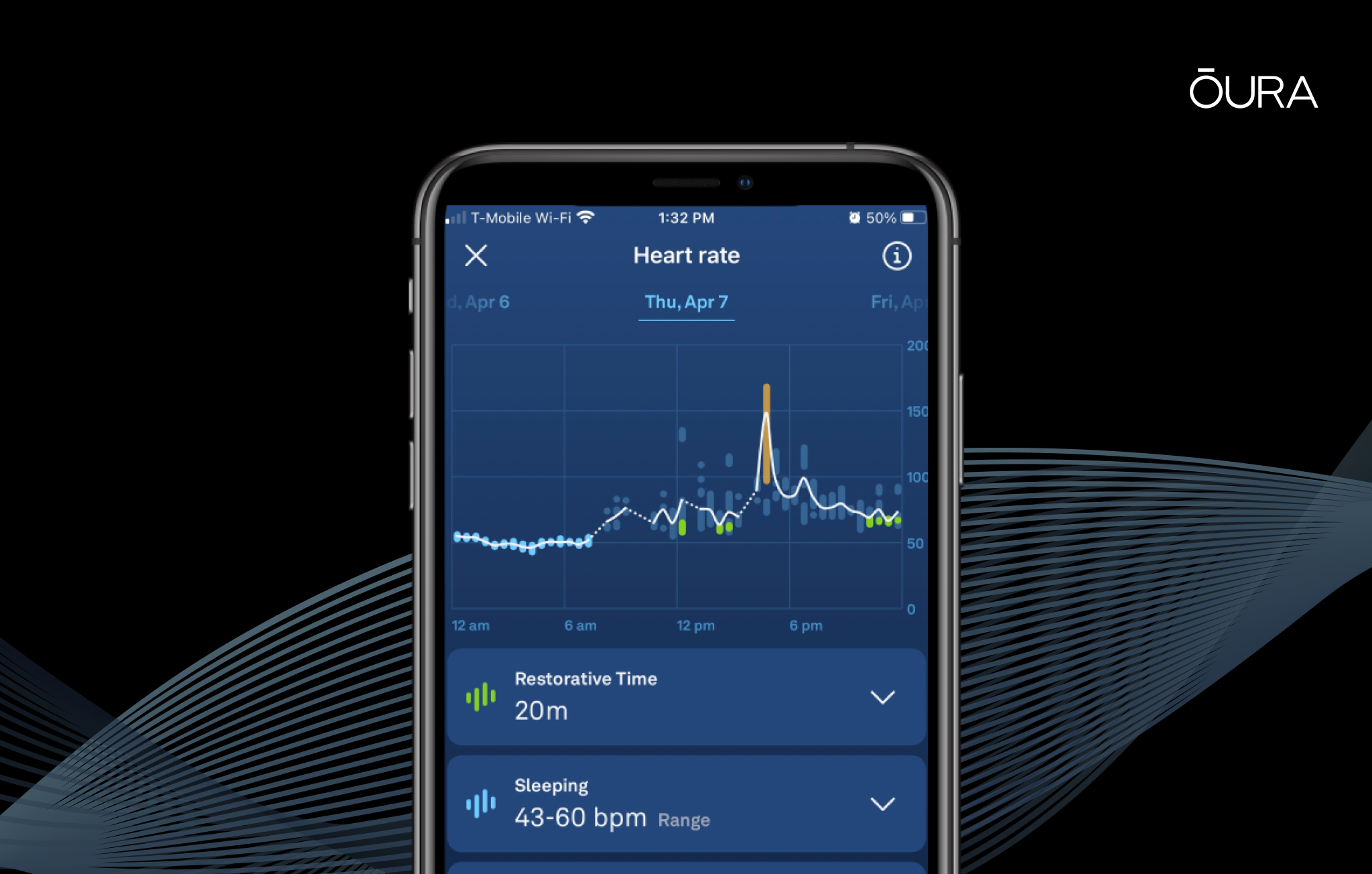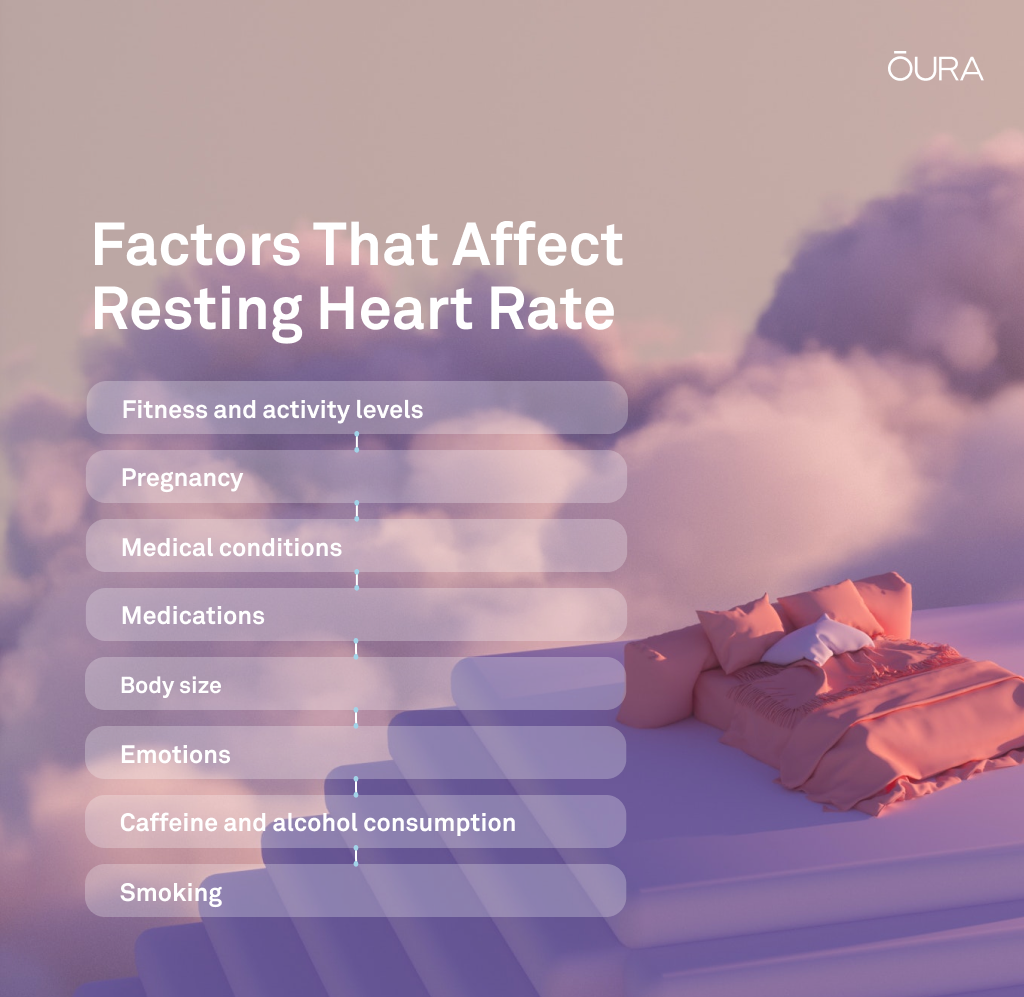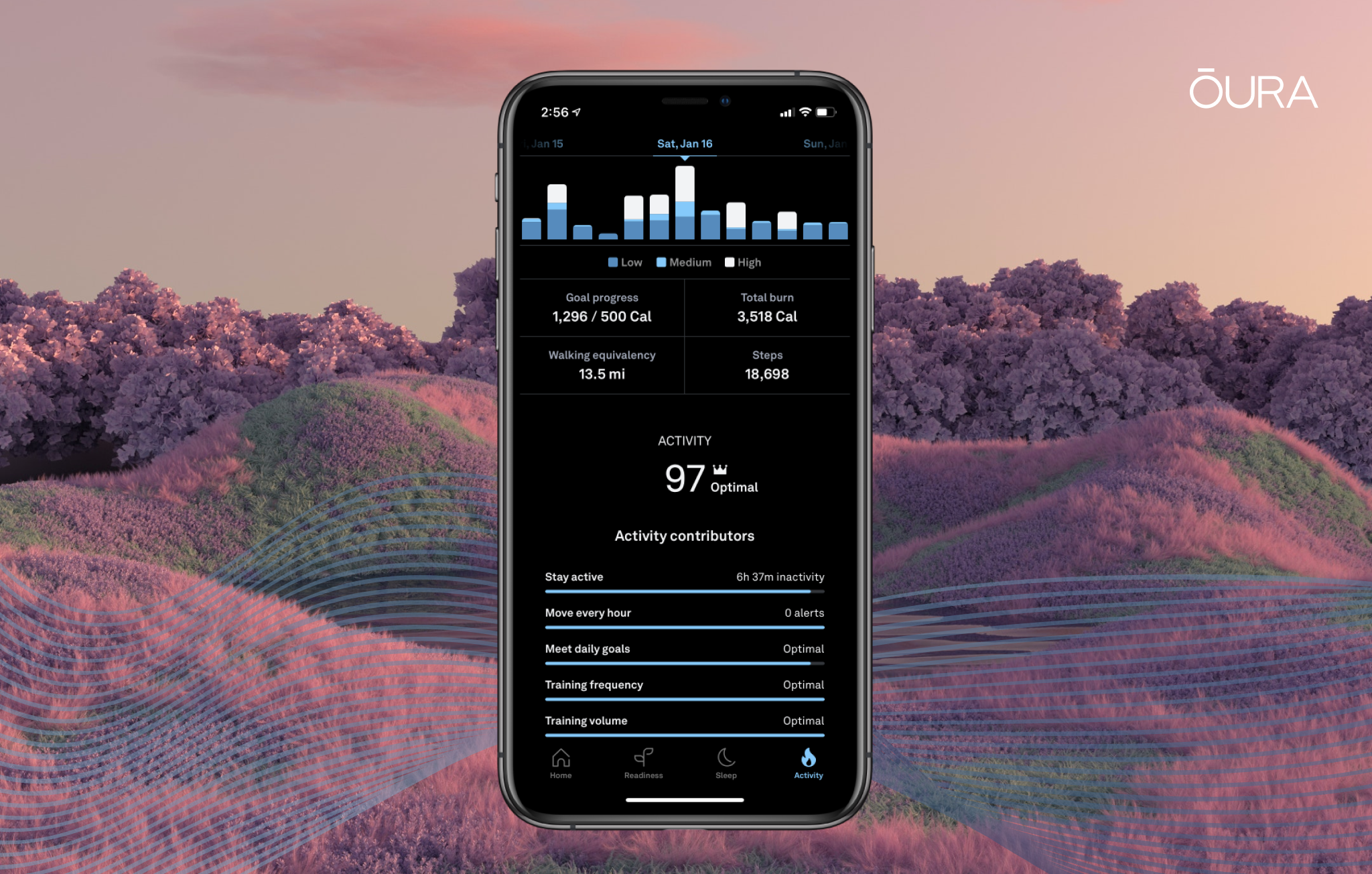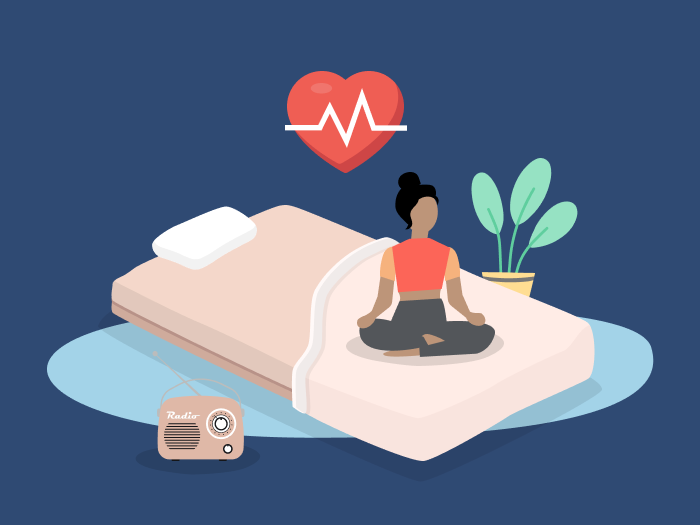- Factors that cause a high resting heart rate (RHR) include fitness level, medical conditions, alcohol, and more.
- The heart rate graph in the Oura App allows you to accurately track your resting heart rate 24/7.
- Tips to lower your RHR include making certain lifestyle changes such adopting a healthy diet, getting adequate sleep, and managing stress.
Resting heart rate, often abbreviated as RHR, is the number of times your heart beats per minute while you are at rest, specifically when you are relaxed and not engaged in physical activity.
Your resting heart rate says a lot about your cardiovascular health. For adults, a normal rate typically falls between 60 to 100 beats per minute (bpm). However, individual variations are common, and factors such as your age, gender, fitness level, and overall health can all influence your specific resting heart rate.
To measure your RHR, you can check your pulse at your wrist or neck and count the beats for 15 seconds, then multiply by four to get the beats per minute. Or, if you’re an Oura member, simply open the Oura App and monitor your heart rate using the Live Heart Rate Graph.
Tracking Your RHR with Oura: What Does Oura Track?
Oura takes your heart rate in real-time with the green LEDs within your Oura Ring Gen3, which enable your ring to take measurements using photoplethysmography (PPG) technology at a frequency of 50Hz
In the daytime heart rate graph, you’ll be able to see color-coded visualizations of your daytime, sleeping, and workout rates, as well as periods of Restorative Time.
How Accurate Is Oura Ring For Heart Rate Tracking?
External validation studies have found “very high agreement” between Oura Ring and the gold-standard ECG measurement. The Oura Ring performed near-perfectly for resting heart rate (r² = 0.996) and extremely well for heart rate variability (r² = 0.980) when compared to a medical-grade ECG device.
By monitoring your RHR consistently, you can gain valuable insights into your heart health, overall fitness levels, and potential concerns. If you’ve ever thought to yourself, “why is my resting heart rate so high?,” know that tracking your trends over time with Oura Ring can help identify patterns and potential causes.
Gain further insights into your overall heart health by using Oura’s new heart health features: Cardio Capacity and Cardiovascular Age.
READ MORE: What is the Average Resting Heart Rate for Oura Members?

8 Factors That Can Lead to A High Resting Heart Rate
Ever wondered “why is my resting heart rate so high?” Numerous factors can contribute to an elevated resting heart rate. These may include:
1. Fitness and Activity Levels
Your fitness and activity levels play a significant role in determining your resting heart rate. Generally, people who are more fit and active tend to have lower RHRs than people who are less fit and active. For example, individuals who are more physically active or have a higher level of cardiovascular fitness can have a resting heart rate as low as 50 or even 40 bpm.
This is because regular exercise helps to strengthen the heart muscle. A stronger heart can pump more blood with each beat, which means that it doesn’t have to beat as often to maintain a normal blood flow. In addition, exercise helps to improve the body’s ability to use oxygen. This means that the body doesn’t have to work as hard to get the oxygen it needs, which can also help to lower RHR. Conversely, if you lead a sedentary life or you’re out of shape, your heart will also be out of shape — it will have to beat more frequently to meet the body’s oxygen demands, leading to a higher heart rate.
| Member Tip: You can see your VO2 Max on the Oura App. This can give you an insight into your physical fitness and cardiovascular capacity. |
2. Pregnancy
During pregnancy, the body undergoes several physiological changes to support the growing fetus. These changes can affect the cardiovascular system, including the resting heart rate, which can increase 10 to 20 bpm, according to research. The elevation of heart rate during pregnancy can be attributed to:
- Increased blood volume: During pregnancy, the amount of blood pumped by the heart increases by around 30 to 50% to provide enough oxygen and nutrients to the developing fetus. This increased blood volume means that the heart needs to pump more blood with each heartbeat, leading to an increased heart rate.
- Hormonal changes: Pregnancy triggers various hormonal changes in the body, including an increase in hormones like progesterone and estrogen. These hormones can affect the cardiovascular system and lead to an elevated heart rate.
| Member Story: For Oura member Kathleen, observing the gradual increase in her resting heart rate from conception to delivery proved to be an enlightening experience. Rather than becoming a cause for concern, she saw it as a natural progression. |
3. Medical Conditions
A higher RHR can be a sign of underlying medical conditions, such as:
- Lung diseases: Lung diseases, including asthma and chronic obstructive pulmonary disease (COPD), can make it difficult to breathe. This can cause the heart to beat faster in order to pump more blood to the lungs.
- Thyroid problems. The thyroid gland produces hormones that regulate the body’s metabolism. When the thyroid gland is overactive (hyperthyroidism), it produces excess hormones, which can speed up the metabolism and cause the heart to beat faster.
- Fever: When you have a fever, your body temperature rises, making it more difficult for bacteria and viruses to survive. In one study, researchers discovered that a 1-degree C increase in body temperature increased heart rate by an average of 8.5 bpm. This rise in temperature was matched with proprietary Oura data, which showed that on days when Oura members tag “flu” or “fever,” their average heart rate increases by an average of 8.5 bpm from their baseline. Learn more about why your heart rate rises when you’re sick here.
- Anemia: Anemia occurs when the body does not have enough healthy red blood cells, which carry oxygen to the body. When there are not enough red blood cells, the heart has to work harder to pump blood throughout the body, and this can cause the heart to beat faster.
- Sleep apnea: Sleep apnea, a sleep disorder that causes breathing to stop and start repeatedly during sleep, can cause the heart to beat faster. This is because when your breathing stops during sleep, your blood oxygen level drops, triggering your body’s fight-or-flight response and causing your heart to beat faster to pump more oxygenated blood to your tissues.
| Member Tip: In the Oura App, you can use the SpO2 feature to detect any changes in blood oxygen levels during sleep, making it possible to see disturbances in breathing that could potentially be caused by sleep apnea. |
4. Medications
Some medications can cause your RHR to be higher than it would be if you weren’t taking them. For example, some antidepressants, such as tricyclic antidepressants, can cause the heart to beat faster because they block the reuptake of certain neurotransmitters, including serotonin. These neurotransmitters are involved in the body’s stress response, and when they are blocked, the body can become more sensitive to stress, which can lead to an increase in heart rate.
 5. Body Size
5. Body Size
Body size can affect resting heart rate in various ways. First, people with larger bodies tend to have higher RHRs than people with smaller bodies because the heart has to work harder to pump blood throughout a larger body. Second, people with excess weight or obesity are more likely to have high blood pressure, which can also contribute to a higher resting heart rate.
| Member Story: Bailey C. credits Oura with helping her achieve her weight loss goals and significantly lowering her resting heart rate from an average of 85-90 bpm to the low 60s. Having lost 110 pounds, she states, “This surgery has changed my life, and Oura has been there for me each step of the way!” |
6. Emotions
When you experience emotions such as anger, stress, anxiety, fear, or excitement, your body’s “fight-or-flight” response is activated. This response triggers the release of hormones such as adrenaline and cortisol, which can increase your heart rate. Furthermore, long-term or chronic stress can contribute to a persistently elevated resting heart rate, impacting your heart health over time.
7. Caffeine and Alcohol Consumption
Alcohol and caffeine are stimulants that can elevate heart rate, at least temporarily. For instance, caffeine can cause a short, but dramatic spike in your blood pressure, which, in turn, elevates your heart rate.
Alcohol, on the other hand, can have a more variable effect on heart rate. In some people, it will slow down heart rate, but in others, it can increase the production of cortisol, a hormone that can increase blood pressure and heart rate. If you regularly consume large amounts of caffeine or alcohol, especially close to bedtime, it may affect your ability to achieve a lower resting heart rate during sleep.
READ MORE: How Does Alcohol Impact Oura Members?
8. Smoking
The chemicals in tobacco products can raise heart rate and blood pressure. For example, the nicotine in cigarettes stimulates the release of adrenaline, which can elevate resting heart rate. Furthermore, smoking tightens the body’s major arteries, which means the heart has to work harder to pump blood throughout the body, leading to an increase in heart rate. Quitting smoking can have significant benefits for heart health and may contribute to lowering resting heart rate.
Tips To Lower Your Resting Heart Rate
After identifying factors that may contribute to your elevated resting heart rate, you can focus on making lifestyle changes to help manage your high heart rate. Below are a few habits that can help:
Exercise Regularly
Engaging in regular physical activity can strengthen your heart and lower your resting heart rate. The amount of exercise that you need to do to lower your resting heart rate will vary depending on your current fitness level. If you are not currently active, you may start by doing some light exercise, such as walking or cycling. As you become more fit, you can gradually increase the intensity and duration of your workouts.
| Member Tip: Oura enables you to automatically track your movement through the day, ensuring you’re aligning your activity with your Readiness. As an Oura member, you’ll also get alerts reminding you to stretch your legs after 50 minutes of inactivity. |

Adopt a Healthy Diet
Eating affects blood flow, which impacts your heart rate. A balanced and heart-healthy diet that includes plenty of fruits, vegetables, whole grains, lean proteins, and healthy fats can positively influence your heart rate. Getting your portion size right can also help you lower your resting heart rate.
According to Dr. Allison R. Zielinski, MD, a Northwestern Medicine cardiologist, “When you eat a large meal, your body diverts more blood to the stomach and digestive system, and away from the heart, with a temporary increase in heart rate.”
Get Adequate, Quality Sleep
Poor sleep can contribute to an elevated resting heart rate and impact overall heart health, so you should prioritize getting enough quality sleep each night. With Oura, you can monitor your overall sleep quality, get a holistic picture of your unique sleep patterns, and insights to help improve sleep quality.
Practice Stress Management
Chronic stress can elevate resting heart rate. Practicing stress-reducing techniques like mindfulness, meditation, deep breathing exercises, yoga, or spending time in nature can help lower stress levels.
| Member Tip: Explore content on the Oura App offers guided meditation content, as well as post-session biofeedback to help you determine the content that works best for your body. |
Continue to Improve Your Cardiovascular Health
Developing a personalized plan to improve cardiovascular health starts with understanding your individual needs and goals. Consider the following steps:
- Set realistic goals: Establish achievable and realistic goals for heart rate management. Whether it’s reducing your resting heart rate by a certain number of beats per minute through exercise or incorporating healthier foods into your diet, setting attainable objectives will keep you motivated.
- Seek professional guidance: If you’re unsure where to start or have underlying health concerns, consider consulting a healthcare professional. A doctor or a registered dietitian can offer personalized recommendations and help you design a tailored plan.
- Stay consistent: Consistency is key to achieving lasting results. Implement your plan gradually, making small, sustainable changes. As you build healthier habits, you’ll likely see positive changes in your resting heart rate over time. That said, it’s important to remember that lowering your resting heart rate is a gradual process that requires time and commitment. Being patient with yourself is important
- Track your progress: Use Oura’s heart health features: Cardio Capacity and Cardiovascular Age. to monitor your heart health and cardiovascular health over time. This allows you to make targeted changes, and assess the effectiveness of your efforts.
Lowering your resting heart rate will help you improve your cardiovascular health and contribute to a healthier and more active lifestyle. However, if you notice persistent or significant deviations from the normal range, over an extended period, it’s essential to consult a healthcare professional to ensure your heart is functioning optimally.











